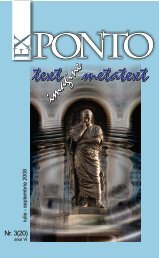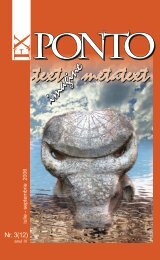Nr. 3 (32) anul IX / iulie-septembrie 2011 - ROMDIDAC
Nr. 3 (32) anul IX / iulie-septembrie 2011 - ROMDIDAC
Nr. 3 (32) anul IX / iulie-septembrie 2011 - ROMDIDAC
You also want an ePaper? Increase the reach of your titles
YUMPU automatically turns print PDFs into web optimized ePapers that Google loves.
Ex Ponto nr. 3, <strong>2011</strong><br />
of gender, ethnicity and totalitarian politics. As a scripted surface whose<br />
characters must be deciphered, Muller’s novels offer a site of contested and<br />
conflicted feminine identities projected against a disjunctive narrative that<br />
acknowledges and establishes its political, social, and cultural specificity while<br />
styling the narrator’s own distinctive femininity complicated by the writer’s own<br />
ethnic othering as a German trapped in the proclamations of Ceausescu’s<br />
strident nationalism. Thus the unnamed narrative persona in all her works,<br />
which are auto fictional texts with the narrative persona and the other<br />
protagonists closely resembling Muller’s own and her friends’ experiences,<br />
positions herself in a category of women writers that exists at the intersection of<br />
gender politics with issues surrounding ethnicity and constructions of othering<br />
and offers a site of contested and conflicted identities projected against a<br />
disjunctive narrative that acknowledges and establishes its political, social<br />
and cultural specificity in 1980s Romania.<br />
Situated at the center of Muller’s fiction, women form a cubistic portrait<br />
comprehending various faces of feminine characters - from her mother who<br />
tells her daughter that one day, as a corollary of her sluttish behavior, she will<br />
bring a Romanian man on her parents’ doorstep thus shunning their ethnic<br />
purity, to Lilli, the tragic character in The Appointment. Shot while trying to<br />
escape by crossing the border illegally to Hungary, the beautiful young woman<br />
is further mauled by the border guards’ dogs whose bites make her dead body<br />
resemble a torn field of red poppies. In the novels, the transition from the<br />
narrative Ich zum wir I to We) is achieved on an immediate level by the doubling<br />
of female characters who are complicit in the activities of the communist<br />
Party/state, like Lola and then Tereza (The Land of Green Plums), and who<br />
also represent the victim-oppressor polarization. The doubling suggests the<br />
physical incorporation of the individual by the Communist state, as in the case<br />
of the narrator’s interrogation and surveillance by the Securitate after she<br />
is betrayed by Tereza, the friend charged with pying on her. In the doubling<br />
of her character, Tereza’s terminal cancer ultimately projects outwardly the<br />
individual reduced to a body that could be controlled and potentially eliminated<br />
by the cancer-like political surveillance, an extended metaphor reminiscent<br />
of Solzhenitsyn’s portrayal of the devastations caused by the police state in<br />
Cancer Ward.<br />
Muller’s focus on the female body as a scriptorial entity, as a script and<br />
representation, features Lola, the girl from the country who joins the Communist<br />
Party and at night lies in waiting for the factory workers to have sex in the park.<br />
This representation of sexuality as a mode of embodiment is tied in The Land of<br />
Green Plums to the embodied nature of the self and its political representation<br />
as material framework and as mode of expression. When interrogated by the<br />
Securitate officer, a certain Captain Piele, the narrator is asked “What does<br />
a woman in bed with 3 men (her friends, Edgar, Kurt and Georg)”. And, when<br />
she does not reply, he goes on to say: “There must be going on like at a dog’s<br />
wedding. That’s why you folk don’t want to get married. That’s something<br />
couples do, not packs.” On another occasion, he has the narrator strip naked<br />
and then asks her to sing to him. Her naked body, she concludes, gives the<br />
interrogator the illusion that she is dead and eliminates stylistic concerns:<br />
after she is allowed to put her clothes back on, he confiscates her notebook<br />
to secure the addresses of all her friends.<br />
Feeling like a dead body, the traumatized narrator wants to kill herself by<br />
jumping from 6 th floor but decides that the sky is too close; she then wants to<br />
136
















